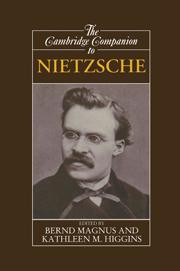Book contents
- Frontmatter
- Introduction to the Cambridge companion to Nietzsche
- Part I Introduction to Nietzsche's works
- Part II The use and abuse of Nietzsche's life and works
- Part III Nietzsche as philosopher
- 5 Nietzsche's kind of philosophy
- 6 Nietzsche ad hominem
- 7 Nietzsche, modernity, aestheticism
- 8 Nietzsche's alleged farewell
- Part IV Nietzsche's influence
- Selected bibliography
- Index
8 - Nietzsche's alleged farewell
The premodern, modern, and postmodern Nietzsche
from Part III - Nietzsche as philosopher
Published online by Cambridge University Press: 28 May 2006
- Frontmatter
- Introduction to the Cambridge companion to Nietzsche
- Part I Introduction to Nietzsche's works
- Part II The use and abuse of Nietzsche's life and works
- Part III Nietzsche as philosopher
- 5 Nietzsche's kind of philosophy
- 6 Nietzsche ad hominem
- 7 Nietzsche, modernity, aestheticism
- 8 Nietzsche's alleged farewell
- Part IV Nietzsche's influence
- Selected bibliography
- Index
Summary
According to a widely discussed recent book by Jiirgen Habermas, Nietzsche's thought represents the “entry into post-modernity”; Nietzsche “renounces a renewed revision of the concept of reason and bids farewell to the dialectic of enlightenment.” In Habermas's unique narrative, this “farewell” to the hopes of the Enlightenment is seen as the decisive European “turning point” that sets the direction for the divergent “postmodernist” paths of Georges Bataille, Jacques Lacan, and Michel Foucault on the one hand, and Heidegger and Derrida on the other. According to Habermas's somewhat tendentious history, the European dissatisfaction with the Enlightenment comes down to the failed attempt of Hegel and the post-Hegelians at a “dialectical” reformulation and completion of such hopes, and a “Nietzschean” inauguration of “irrationalism” and therewith a complete rejection of such hopes.
Such a popular, now nearly standard characterization of Nietzsche as the decisive “post-” or “counter-Enlightenment” thinker is painted in very broad strokes by Habermas. However, for all the scholarly problems with Habermas's characterizations, there is certainly something right in treating so much recent, influential European philosophy as “neo-Nietzschean,” and perhaps even in the extraordinary claim that "Friedrich Nietzsche is today the most influential philosopher in the Western, non-Marxist world."
- Type
- Chapter
- Information
- The Cambridge Companion to Nietzsche , pp. 252 - 278Publisher: Cambridge University PressPrint publication year: 1996
- 1
- Cited by

